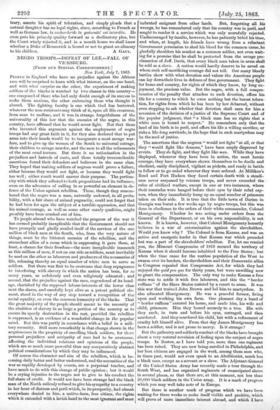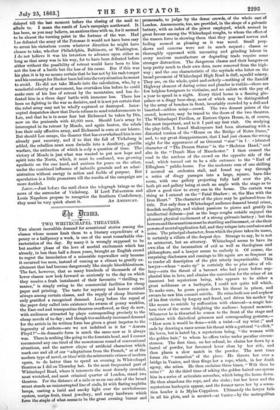NEGRO TROOPS.—DEFEAT OF LEE.—FALL OF VICKSBURG.
[PROM OUR SPECIAL CORRESPONDEZTT.1
New York, July 7, 1863. PEOPLE in England who have no prejudice against the African race will be surprised to learn with what interest, on the one hand, awl with what surprise on the other, the experiment of making soldiers of the blacks is watched by two classes in this country— one composed of those who had only doubt enough of its success to make them anxious, the other embracing those who thought it absurd. The fighting faculty is one which God has bestowed, whatever the non-resistants may think of it, upon all His creatures, from man to mollusc, and it was in strange forgetfulness of the universality of this law that the enemies of the negro, in this country, have affirmed that he would never fight. Not that those who invented this argument against the employment of negro troops had any great faith in it, for they also declared that to put arms into their hands would be to inaugurate a most savage war- fare, and to give up the women of the South to universal outrage, their children to savage murder, and the men to all the refinements of the most cruel torture. But there is no ratiocination in the prejudices and hatreds of caste, and these totally irreconcileable assertions found their defenders and believers in the same class. They hoped that making soldiers of negroes would prove a failure, either because they would not fight, or because they would fight too well ; either result would answer their purpose. The pertina- city with which they adhered to both propositions had its influence, even on the advocates of calling in so powerful an element in de- fence of the Union against rebellion. These, though they remem- bered that the negro was a man, naturally endowed, in all proba- bility, with a fair share of animal pugnacity, could not forget that he had been for ages the subject of a terrible oppression, and that his animal courage, as well as some other manly qualities, might possibly have been crushed out of him.
To people abroad who have watched the progress of the war it has seemed probably inexplicable that the Government should not have promptly and gladly availed itself of the services of the one million of black men at the South, who, from the very nature of things, must be the bitterest enemies of the rebellion, and the staunchest allies of a cause which in suppressing it gave them, at least, a chance for their freedom—the more inexplicable inasmuch as this million of men, if not on our side as soldiers, must inevitably be used on the other as labourers and producers of the necessaries of life, releasing thereby an equal number of white men to serve as soldiers. But there was first to be overcome that deep repugnance to interfering with slavery in which the nation has been, for so many years, so sedulously and even religiously educated ; and second, that the prejudice against the race, engendered of its bond- age, cherished by the supposed labour-interests of the lower class next the slaves, and carefully kept alive as a potent political ele- ment, stood in the way of any step toward a recognition of the social equality, or even the common humanity of the blacks. That the great majority of the people should assent to the necessity of the abolition of slavery in so large a portion of the country as to ensure its speedy destruction in the rest, provided the rebellion is suppressed, is an evidence of a wonderful change in the popular mind. But this was partly in accordance with a belief in a mili- tary necessity. Still more remarkably is that change shown in the acquiescence in the propriety of enrolling black soldiers, for there personal prejudices and antipathy of race had to be overcome, affecting the individual relations and opinions of the people, which are so much more powerful than any comparatively abstract political considerations by which they may be influenced.
Of course the character and aim of the rebellion, which is be- coming daily better and better understood, and the necessities of the war so rapidly developed by events, are a perpetual teacher, and have much to do with this change of public opinion ; but it would be a crying injustice to the negro not to give to his conduct the full share of credit. It would not have been strange had the black man of the North sullenly refused to give his sympathy to a country in her hour of distress and peril which, in its prosperity, had almost everywhere denied to him, a native-born, free citizen, the rights which it extended with a iavieh hand to the most ignorant and most imbruted emigrant from other lands. But, forgetting all his wrongs, he has remembered only that his country was in peril, and sought to render it a service which was only scornfully rejected. Undiacouraged by insults, however, he has patiently bided his time, and when, at length, his friends have wrung from a reluctant Government permission to shed his blood for the common cause, he gleefully shoulders his musket as a common soldier, not even wait- ing for a promise that he shall be protected from the savage pro- clamation of Jeff. Davis, that every black man taken in arms shall be sold as a slave. A nation would hardly deserve to be saved on whom such self-sacrificing courage did not tell. Our many bloody battles show with what devotion and valour the American people can lay down their lives in defence of free government. They fight for home and country, for rights of which they know, by long en- joyment, the precious value. But the negro, with a full compre- hension of the penalty that attaches to such devotion, offers his life for a country to which he owes nothing but the barest tolera- tion, for rights from which he has been by law debarred, without even stopping to ask whether that devotion shall earn for him a reversion of the decision of a justice of the Supreme Court and of the popular judgment, that "a black man has no rights that a white man is bound to respect." He remembers only that the land of his birth is in peril, and offers his life a willing sacrifice, or risks a life-long servitude, in the hope that in such martyrdom may be the seed of justice.
The assertions that the negroes "would not fight "at all, or that they "would fight like demons," have been amply disproved by events. They do fight, and they fight like men. While they have displayed, wherever they have been in action, the most heroic courage, they have everywhere shown themselves to be docile and obedient, easily disciplined, vigilant as pickets, and ready in battle to follow or to go unled wherever they were ordered. At Milliken's Bend and Port Hudson they faced certain death with a steadi- ness never surpassed by veteran troops, and never exceeded the • rules of civilized warfare, except in one or two instances, where their comrades were hanged before their eyes by their rebel cap- tors, when they immediately hung up an equal number of prisoners taken on their side. It is true that the little town of Darien in Georgia was burnt a few weeks ago by negro troops, but this was done in obedience to the orders of their white commander, Colonel Montgomery. Whether he was acting under orders from the General of the Department, or on his own responsibility, is not known. It is known, however, that Colonel Montgomery honestly believes in a war of extermination against the slaveholders. Would you know why The Colonel is from Kansas, and was an active and energetic leader in that Kansas war which preceded but was a part of the slaveholders' rebellion. For, let me remind you, the Missouri Compromise of 1819 secured the territory of Kansas when it should become inhabited to the Free States ; but when the time came for the restless population of the West to swarm over its borders, the slaveholders and their Democratic allies in Congress repealed that Compromise Act, for which they had enjoyed the quid pro quo for thirty years, but were unwilling now to grant the compensation. The only way to make Kansas a free state was to settle it with free labourers, and this the "border ruffians" of the Slave States resisted by a resort to arms. It was this war that trained John Brown and led him to martyrdom. It also educated Montgomery. He was a peaceful farmer, living upon and working his own farm. One pleasant day a band of "border ruffians" entered his house, and made him, his wife and child, prisoners. Him they bound securely to a tree. His wife they each, in turn and before his eyes, outraged, and then murdered. And they murdered his child, but with a refinement of cruelty left himself alive. From that day James Montgomery has been a soldier, and is not prone to mercy. Is it strange?
But the gallantry and soldierlyconduct of the blacks have brought about a very natural revulsion of feeling upon the subject of negro troops. In Boston, as I have told you, more than one regiment has been raised. They are now being enrolled in Philadelphia, and her best citizens are engaged in the work, among them men who, in times past, would not even speak to an Abolitionist, much less a black man, except as a servant or a slave. The Adjutant-General of the United States Army has recently made a tour through the South West, and has organized regiments of emancipated slaves in several places, so that there are, at this moment, not less than 20,000 black soldiers in the Union army. It is a mark of progress which you may well take note of in Europe.
But there is another mark of progress which we have been waiting for three weeks to make itself visible and positive, which will prove of more immediate interest abroad, and which I have Later.—Just before the mail closes the telegraph brings us the news of the surrender of Vicksburg. If Lord Pabnerston and Louis Napoleon propose to recognize the Southern Confederacy,































 Previous page
Previous page